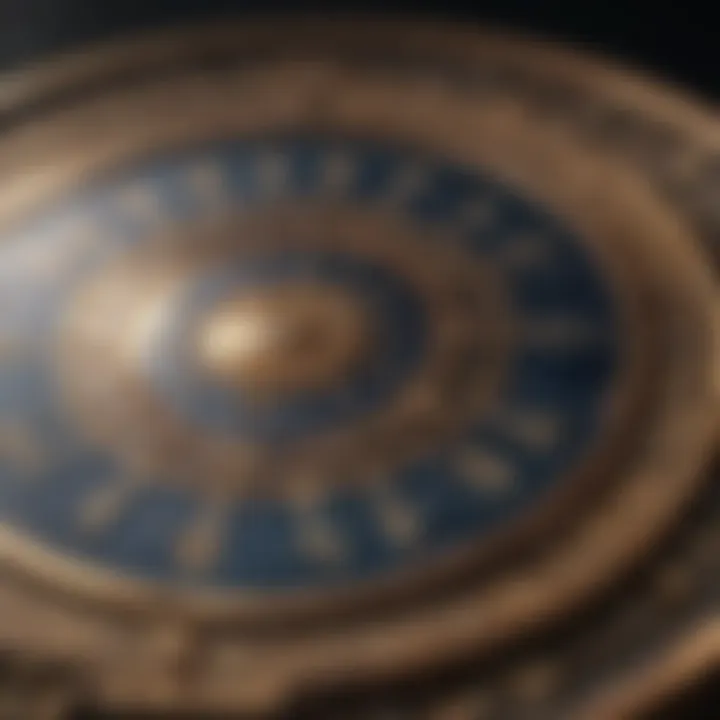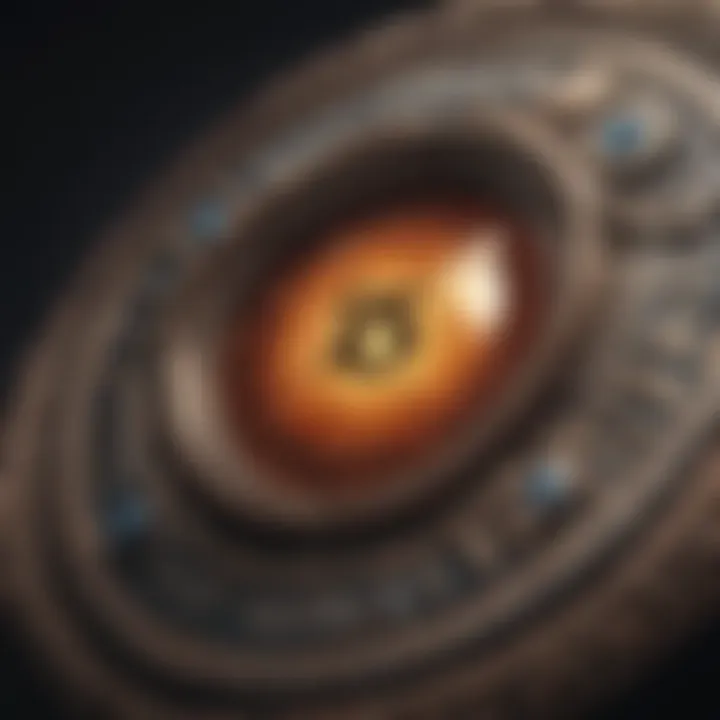Unveiling Future Insights Through Birth Dates


Intro
The exploration of how an individual’s date of birth can influence their future is a topic that intrigues many. This inquiry delves into various frameworks like astrology and numerology, seeking to uncover the connections that may exist between celestial events and personal outcomes. Understanding these relationships allows individuals to gain insights into their potential trajectories, helping them make informed decisions about their lives. In this article, we will embark on a comprehensive journey through the realms of zodiac signs, astrological insights, and the practical applications of horoscopes.
Understanding the Zodiac
Overview of Zodiac Signs
Zodiac signs are tied to the twelve constellations of the zodiac, each corresponding to a specific segment of the year. The signs range from Aries, which begins in March, to Pisces, concluding in February. Each zodiac sign is believed to carry unique traits and insights that can reveal an individual’s character and behaviors.
Sign Traits and Characteristics
Every zodiac sign has distinctive traits. For instance:
- Aries: Adventurous, assertive, full of energy.
- Taurus: Steadfast, practical, enjoys the finer things.
- Gemini: Communicative, versatile, curious.
- Cancer: Nurturing, intuitive, compassionate.
- Leo: Charismatic, confident, natural leader.
- Virgo: Analytical, detail-oriented, helpful.
- Libra: Diplomatic, balanced, seeks harmony.
- Scorpio: Passionate, resourceful, deeply emotional.
- Sagittarius: Optimistic, adventurous, philosophical.
- Capricorn: Disciplined, responsible, ambitious.
- Aquarius: Innovative, independent, humanitarian.
- Pisces: Artistic, empathetic, dreamer.
These traits can be useful in predicting tendencies and emotional responses of individuals, giving us clues about their future.
Elemental Qualities
The zodiac signs are also classified into four elemental groups: fire, earth, air, and water. Each element offers a deeper understanding of the nature of the signs within it:
- Fire: Aries, Leo, Sagittarius. Associated with passion and enthusiasm.
- Earth: Taurus, Virgo, Capricorn. Represents stability and pragmatism.
- Air: Gemini, Libra, Aquarius. Linked to intellect and communication.
- Water: Cancer, Scorpio, Pisces. Connected to emotions and intuition.
This elemental division helps in enhancing the understanding of how different signs interact with the world around them and with each other.
Astrological Insights
Current Astrological Trends
Astrology is not static; it evolves. Current astrological trends can provide valuable perspectives on societal shifts and personal experiences. For example, during particular planetary alignments, individuals may notice changes in their life patterns or opportunities arising in their work or relationships.
Influence of Celestial Events
Celestial events, such as eclipses or retrogrades, can also shape our destinies. They are thought to influence our emotions, decisions, and opportunities. Keeping track of these events can be crucial for anyone looking to utilize astrology in a practical sense.
How to Interpret Your Birth Chart
An individual’s birth chart is a map of where the planets were at the time of their birth. Understanding this chart is key to unlocking deeper insights about oneself. It requires a comprehension of aspects, houses, and transits.
Horoscope and Predictions
Monthly or Weekly Forecasts
Horoscopes provide predictions based on current planetary movements, offering insights into short-term opportunities or challenges. They can serve as guides for decision-making.
Personalized Horoscope Reading
A personalized horoscope reading takes into account an individual’s complete birth chart, leading to more specific insights tailored to their unique circumstances. This reading can delineate paths for personal or professional development.
Compatibility Readings based on Zodiac Signs
Understanding compatibility through zodiac signs helps in navigating personal relationships. It allows individuals to comprehend dynamics in their posts and interactions, potentially predicting harmony or conflict in relationships.
Astrological insights can support self-discovery by shedding light on one’s strengths and weaknesses, opening the door to a greater understanding of oneself and one’s potential.
In summary, the study of how one's date of birth may influence their future lifestyle is a blend of historical wisdom and modern practicality. It can help illuminate paths to fulfillment and personal growth.
Preamble to Astrological Predictions
Astrological predictions based on an individual's date of birth offer a fascinating glimpse into human behavior and potential life paths. The principles behind astrology encompass both quantitative data, such as the exact time and location of birth, and qualitative insights derived from astrological interpretation. This dual approach serves as a foundation for understanding how celestial dynamics can shape personal experiences.
In this section, we will explore the significance of astrological predictions, emphasizing its relevance to areas such as personality assessment, life choices, and relational dynamics. Benefiting from these insights can lead to enhanced self-awareness and informed decision-making.
Astrology operates on the premise that the positions of celestial bodies at the time of birth influence personality traits and life outcomes. In this way, astrologers can provide a structured framework for individuals seeking to navigate life's uncertainties. Some key benefits of understanding astrological predictions include:
- Enhanced personal understanding: Knowing one's astrological influences can illuminate character strengths and weaknesses.
- Guidance in critical decision-making: Astrology can serve as a resource for making life decisions, from career choices to relationship considerations.
- Insight into relationships: Understanding partners' astrological profiles can foster better communication and compatibility.
However, it is essential to approach this practice with a critical mindset. While many find value in astrological interpretations, skepticism exists regarding their accuracy and relevance. It is crucial for individuals to evaluate the insights gained through astrology critically, balancing intuition with rational scrutiny.
Understanding your astrological influences can unveil aspects of your personality you might not have considered.
Conceptual Foundations of Astrology
Astrology is an intricate discipline that intertwines various elements to generate insights about individuals and their lives. Understanding the conceptual foundations of astrology is pivotal for grasping how the principles of this ancient practice can provide foresight into one’s future based on their date of birth. By delving into the nuanced interplay of celestial bodies, symbols, and human characteristics, one can appreciate the deep-rooted significance of astrological predictions.
The conceptual basis is essential for several reasons:
- Framework for Interpretation: Astrology offers a structured method to interpret the influence of celestial positions on human experiences. This understanding forms the foundation of astrological readings.
- Cultural Significance: Historically and culturally, astrology has played a crucial role in diverse societies. Recognizing its historical significance deepens the appreciation of its practice today.
- Personal Guidance: Astrological frameworks provide insights not only into individual traits but also into future potentials. This can serve as a guiding tool for personal choices and decisions.
- Skepticism and Validation: As astrology faces scrutiny, understanding its conceptual underpinnings allows for a critical evaluation of its validity and relevance in contemporary society.
“The study of astrology helps in understanding the cosmos and one’s place within it.”
Historical Context of Astrology
Astrology dates back thousands of years, with its origins intertwined in the cultural fabric of ancient civilizations. The earliest records can be traced back to Babylon around the second millennium BCE. Here, astrology developed with the observation of celestial movements and their correlation to earthly events. Ancient civilizations such as the Egyptians and Greeks adopted and adapted these ideas, leading to a rich tapestry of astrological thought. Recognizing this history helps in understanding the evolution of astrological practices and their adaptation through time.
Astrology versus Astronomy
It is critical to differentiate between astrology and astronomy, even though they share a common historical background. Astronomy is a science focused on the observation and study of celestial bodies and their movements. This field utilizes rigorous methodologies and mathematical models to understand the universe. On the other hand, astrology interprets these celestial movements as influences on human behavior and life events. While astronomy seeks to describe the physical nature of stars, planets, and galaxies, astrology aims to interpret their meanings in a social and personal context, which cultivates a different purpose.
Astrological Systems: Western, Vedic, and Chinese
Astrology is not monolithic; it comprises distinct systems, each with unique methodologies and beliefs.
- Western Astrology: Rooted in Hellenistic traditions, Western astrology employs the tropical zodiac, focusing on the position of the Sun relative to the Earth. Key components include sun signs, moon signs, and rising signs, which together form a comprehensive natal chart.
- Vedic Astrology: Originating from ancient India, Vedic astrology, or Jyotish, utilizes the sidereal zodiac, which is based on the fixed positions of constellations. It places great emphasis on the moon’s position and its phases, offering insights that focus on the karmic progress of individuals.
- Chinese Astrology: This system is heavily influenced by Chinese philosophy and involves a 12-year cycle, each represented by an animal. Chinese astrology emphasizes the year of birth and its correlation to elemental cycles, which significantly shapes personality and destiny.
Understanding these astrological systems provides a more holistic view of how different cultures interpret celestial influences and predict human experiences.
The Role of Zodiac Signs
The examination of zodiac signs holds significant importance in the broader discourse of astrology. Each zodiac sign corresponds to specific attributes and characteristics that can aid in understanding individuals better. From the perspective of astrological predictions, zodiac signs can provide insights into behaviors, tendencies, and potential life paths. Their relevance stretches beyond mere divination; it encompasses personal growth, relationship dynamics, and career choices.


Understanding Zodiac Signs
Zodiac signs are classifications established by dividing the sky into twelve equal parts, each named after a constellation. Each person is assigned a zodiac sign based on their date of birth. This assignment is pivotal because it serves as the foundation for astrological interpretation. For instance, those born under Aries are often viewed as assertive and energetic, while those of Libra are typically seen as harmonious and diplomatic. Understanding these nuances can enhance both self-awareness and interpersonal relations.
Elements and Modalities
Zodiac signs are categorized into four elements: Fire, Earth, Air, and Water. Each element contributes to the fundamental nature of the signs within it. Fire signs, including Aries, Leo, and Sagittarius, are associated with passion and creativity. Earth signs like Taurus, Virgo, and Capricorn emphasize practicality and stability. Air signs such as Gemini, Libra, and Aquarius symbolize intellect and communication, while Water signs, comprising Cancer, Scorpio, and Pisces, relate to emotions and intuition.
Additionally, modalities impact how each sign expresses its elemental nature. The modalities are Cardinal, Fixed, and Mutable. Cardinal signs initiate action and are often leaders. Fixed signs are stable and resistant to change, while Mutable signs are adaptable and flexible. This combination of elements and modalities fosters a deeper understanding of the complexities in personality traits influenced by one’s zodiac sign.
How Zodiac Signs Influence Personality
The belief that zodiac signs can shape personality is integral to astrology. Many proponents argue that the cosmic arrangement at the time of an individual's birth instills certain characteristics that develop as the person ages. For instance, someone under the sign of Scorpio may exhibit intense emotions and a strong will, while a person born under Gemini may display versatility and sociability.
Astrological enthusiasts often utilize these insights for personal development, recognizing behavioral patterns linked to their signs. This can guide individuals in making decisions about relationships, careers, and self-improvement strategies. Overall, the impact of zodiac signs on personality offers a lens through which to view oneself and others, making them a vital piece in the puzzle of astrological prediction.
The examination of zodiac signs is vital for understanding one’s self and others, offering pathways for personal growth and improved relationships.
Numerology and Birth Dates
Numerology offers a unique lens through which we can analyze the numerical significance of the date of birth. It states that each person carries a specific vibrational pattern connected to their birth date. By understanding these vibrations, individuals can gain invaluable insights into their life paths and potential futures. Numerology is not just about predicting outcomes; it also serves as a tool for self-discovery and personal empowerment.
Key benefits of exploring numerology in relation to birth dates include:
- Self-awareness: Knowing your personal numbers helps you to understand your strengths and weaknesses.
- Guidance for decision-making: Numerological analysis can provide clarity in making significant life choices, such as career paths or relationships.
- Enhanced compatibility analysis: By comparing personal numbers, one can assess compatibility with others on various levels.
Incorporating numerology into the broader discussion of astrological predictions fosters a more profound understanding of how various elements interplay to shape personal trajectories.
Basics of Numerology
Numerology is rooted in the belief that numbers hold energetic significance. Each number from 1 to 9 possesses distinct characteristics and meanings. At its core, numerology operates on the principle that the universe is structured and organized in various mathematical formulas.
Some foundational concepts in numerology include:
- Single-digit numbers: These range from 1 to 9, each having unique attributes.
- Master numbers: Numbers like 11, 22, and 33 are considered master numbers. They embody higher spiritual significance and potential.
- Reduction technique: Larger numbers are often reduced to a single-digit form to uncover their fundamental essence. For example, the number 27 is reduced to 2 + 7 = 9.
Understanding these basics allows individuals to engage effectively with deeper numerological concepts.
The Life Path Number
The Life Path Number, calculated from the full date of birth, serves as one of the most crucial aspects of numerology. It highlights the individual’s lifelong journey and the primary lessons they may encounter. To calculate the Life Path Number, one typically adds up all the digits in the birth date and then reduces them to a single digit or a master number.
For example, a birth date of July 14, 1985, is calculated as follows:
- Convert the birth date to digits: 7 (July) + 1 + 4 (day) + 1 + 9 + 8 + 5 (year).
- Add the digits together: 7 + 1 + 4 + 1 + 9 + 8 + 5 = 35.
- Reduce: 3 + 5 = 8.
Thus, the Life Path Number is 8.
Attributes of Life Path Numbers
- 1: Leadership and independence.
- 2: Harmony and cooperation.
- 3: Creativity and self-expression.
- 4: Stability and practicality.
- 5: Freedom and adventure.
- 6: Responsibility and nurturing.
- 7: Spirituality and introspection.
- 8: Power and ambition.
- 9: Compassion and humanitarianism.
This number provides insights into both the challenges and advantages one might face in life, thus influencing choices and direction.
Numerology and Future Predictions
The intersection of numerology and future predictions is profound. When an individual understands their numerological numbers, they can anticipate significant life events and choices leading them to their desired paths.
- Timing key events: Numerology suggests favorable times for changes or new beginnings based on personal numbers.
- Long-term trends: By examining recurring numerical patterns, one can predict cycles of growth and potential challenges.
- Alignment with personal goals: Numerology encourages individuals to align with their intrinsic energy, enhancing the likelihood of achieving personal and professional goals.
In summary, the insights derived from numerology and birth dates empower individuals in making informed life decisions. By analyzing their Life Path Number and engaging with numerological principles, people gain clarity, direction, and a renewed sense of purpose.
Planetary Influences and Aspects
Understanding the role of planetary influences and aspects is crucial for those interested in predictions based on date of birth. Astrology posits that the positions and movements of planets at the time of a person's birth can offer insights into their personality traits, potential challenges, and even future events. This section explores the specific elements that make planetary influences significant in astrological practices.
Understanding Planetary Positions
Planetary positions refer to where each planet is located in the zodiac at a particular time. These positions are recorded in what is known as a natal chart, which serves as a personalized map of the heavens at the moment of birth. Analyzing these positions can reveal a wealth of information.
- Personal Traits: Each planet symbolizes specific qualities. For instance, Mars symbolizes aggression and drive, while Venus represents love and harmony. The position of these planets affects personal characteristics.
- Life Choices: The applicable planets can indicate career paths, relationships, and life choices. This insight can guide individuals in making more informed decisions.
Transits and Their Meanings
Transits involve the ongoing movements of planets as they travel through the zodiac. The significance of transits lies in their potential to activate different areas of an individual’s natal chart. Each transit can represent opportunities, challenges, or turning points depending on the aspects formed with natal planets.
- Timing of Events: Transits can help determine timing for important life events, such as career changes or personal transformations.
- Awareness of Energy: Being aware of current planetary transits enables individuals to align their actions with the increasing or diminishing energy indicated by these movements.
Aspects and Relationships Between Planets
Aspects define the angles formed between planets in a natal chart or during transits. These angles are crucial as they illustrate how the energies of different planets interact. Understanding aspects enhances predictive capabilities and offers deeper insights into personal dynamics.
- Major Aspects: Conjunctions, oppositions, squares, trines, and sextiles each represent different kinds of energies. For instance, a trine is considered harmonious, fostering ease, while a square can indicate tension and obstacles.
- Impact on Choices: Recognizing the relationships between planets can inform individuals about potential conflicts or synergies in their lives. This information can aid in understanding current dilemmas or trends that impact future choices.
"The intricate dance of planetary influences and their aspects not only reveals a person's potential but also serves as a guide for navigating their unique life path."
These components of planetary influences and aspects are not just theoretical constructs. They provide practical tools for understanding oneself and predicting future trends based on one's date of birth. Keeping these elements in mind enhances the efficacy of astrological practices.
Astrological Tools for Prediction
Astrological tools serve as essential instruments for interpreting the subtleties of an individual's birth date. By utilizing these tools, practitioners can derive personalized insights and predictions. Each tool has its unique characteristics and functions, which enhance the understanding of one's life path and future.
Natal Charts
Natal charts are integral to astrological predictions. They are personalized maps generated from the exact time, date, and place of an individual's birth. This chart displays the positions of celestial bodies—such as the Sun, Moon, and planets—at that specific moment.
Analyzing a natal chart can reveal numerous aspects of a person's life, including their strengths, weaknesses, and potential future developments. It acts as a blueprint that astrologers use to interpret personality traits and predict future events. Each chart requires careful examination to yield accurate insights.
Some key elements of natal charts include:
- Zodiac signs: They represent personal characteristics and tendencies.
- Houses: These divisions indicate different life areas, such as career and relationships.
- Aspects: The angles between planets can reveal important relationships that influence an individual’s life.


Understanding these elements can illuminate various life trajectories, thus reinforcing the value of natal charts in making predictions based on birth date.
Horoscopes and Forecasts
Horoscopes are more mainstream tools in astrology. They provide daily, weekly, or monthly predictions based on the positions of celestial bodies. Horoscopes can offer practical guidance for daily decision-making and future planning.
The significance of horoscopes lies in their ability to connect personal experiences with broader cosmic events. Each zodiac sign has its own set of forecasts, aligning with current planetary influences that may affect individuals within that sign. Some focus areas include:
- Personal development: Suggestions for self-improvement based on current astrological trends.
- Relationship insights: Guidance on how to navigate interpersonal dynamics.
- Career movement: Advice on opportunities and challenges within professional environments.
While horoscopes serve as general guidance, their effectiveness can improve when read alongside a detailed natal chart for more context.
Divination Methods and Their Relevance
Various divination methods complement astrology in providing insights into the future. Techniques such as Tarot reading, I Ching, or rune casting offer additional layers of interpretation. Each method operates on principles that resonate with astrological beliefs.
For instance, Tarot readings can be aligned with specific astrological events to enhance accuracy. The synergy between Tarot and astrology is particularly valued among practitioners. Benefits include:
- Enhanced intuition: These methods can sharpen intuitive understanding and foresight.
- Multi-dimensional insights: Combining tools creates a broader perspective on predictions.
The Skepticism Towards Astrology
Skepticism towards astrology is an important theme within the broader context of this article. As we explore how one's date of birth may influence their future, understanding skepticism is essential. This skepticism often arises from a scientific perspective, where astrology is seen as lacking empirical support. Critics argue that astrological predictions fail to deliver consistent results across diverse populations. This lack of scientific validation raises questions about the credibility of astrology as a predictive discipline.
In addition to scientific critiques, there are also social and psychological factors at play. Many individuals view astrology as mere entertainment. They may not take claims seriously, leading to skepticism based on personal experience rather than evidence. Yet, it is essential to recognize that these critiques often stem from a misunderstanding of astrology's complex principles and intended purpose.
Common Critiques of Astrological Predictions
There are several common critiques regarding astrological predictions. Firstly, skeptics often point out that astrology appears to rely heavily on generalized statements. Critics argue that horoscopes often contain vague content that can apply to anyone, leading to the illusion of accuracy. This phenomenon can be attributed to a cognitive bias known as the Barnum effect, where individuals perceive personalized relevance in ambiguous statements.
Furthermore, astrological predictions are generally categorical, often grouping people into specific zodiac signs without adequately considering personal nuances. This oversimplification can undermine the validity of predictions.
Another critique regarding astrology is its reliance on ancient beliefs that may not align with modern understanding of the universe. Critics contend that concepts such as planetary influence lack a scientific foundation; thus, they question the very basis of astrological claims.
The Psychological Perspective
From a psychological perspective, skepticism can be both beneficial and hindering. The human mind craves patterns and explanations for events. Astrology appears to provide a framework for individuals to navigate complexities in life. Some psychologists argue that, despite its lack of scientific validation, astrology can hold value as a psychological tool. For certain people, astrology can promote personal reflection and self-understanding, arguably justifying its role in their lives, even if scientifically unfounded.
However, the over-reliance on astrological interpretations can lead to cognitive dissonance. Believers may ignore evidence contradicting their views, clinging firmly to expectations set by astrological claims. This selective thinking can hinder personal growth and open-mindedness.
Cognitive Biases in Belief Systems
Cognitive biases play a significant role in shaping beliefs about astrology. One such bias is confirmation bias, where individuals favor information that aligns with their preexisting beliefs. In the context of astrology, believers may specifically seek validation through experiences confirming astrological predictions. Consequently, they may dismiss instances where predictions did not come true, contributing to a skewed perception of astrology's effectiveness.
Another relevant bias includes the illusory correlation, where individuals associate two unrelated events. For example, if someone experiences a positive outcome following a specific astrological forecast, they may grow to believe that astrology is reliable. This inclination can create a firm conviction in the accuracy of astrology, despite the absence of systematic evidence.
Astrology remains a subject of debate, with valid points on both sides. Critiques informed by skepticism challenge practitioners to refine their approaches, while believers may find comfort and meaning in these cosmic interpretations. Ultimately, balancing skepticism with open-mindedness may enrich an individual's understanding of astrology and its implications for future predictions.
Practical Applications of Astrological Insights
Astrology often serves as a lens through which individuals can explore their lives. Practical applications of astrological insights are not just theoretical; they have tangible impacts on how one approaches personal growth, relationships, and career decisions. The relevance of this topic lies in its capacity to inform and enhance various aspects of everyday life. By understanding the astrological frameworks, people may find guidance that resonates with their experiences and aspirations.
Using Astrology for Personal Growth
Astrology can provide valuable tools for personal growth. Individuals may use their natal charts to identify strengths and weaknesses. The positions of various planets at the time of birth can reveal intrinsic characteristics. For instance, a person with a strong placement in their Moon sign might be more attuned to their emotions.
Practicing self-awareness is a direct benefit of astrological knowledge. Recognizing patterns related to one's Sun or Ascendant sign can foster understanding of both positive traits and impediments. Keeping a journal that notes how astrological transits align with personal experiences can deepen this understanding. Additionally, it opens avenues for personal change.
In summary, astrology offers a framework for continuous self-reflection. Embracing astrological insights not only promotes self-acceptance but also encourages proactive engagement with one’s potential.
Astrology and Relationship Compatibility
Astrology plays a significant role in understanding relationship dynamics. Compatibility assessments between two individuals can be facilitated through synastry, which evaluates how their planetary positions interact. By examining Sun, Moon, and Venus placements, one can uncover emotional resonances or potential conflicts.
Compatibility in astrology is not merely about checking markers. It involves a deep understanding of how different energies influence relationships. For instance, a fire sign may need to consider a partner's earth sign tendencies. Real insights come from observing how these elements interact over time.
Moreover, astrological insights help individuals to communicate better with their partners. Knowing each other’s emotional triggers and preferences can lead to constructive dialogue. This understanding can decrease misunderstandings and increase harmony, offering a pathway to deeper bond.
Navigating Career Paths with Astrological Guidance
Astrological guidance can be quite beneficial when it comes to career choices. The Midheaven in a natal chart often highlights an individual's professional aspiration. Looking at the planets in the 10th house can reveal inclinations toward certain fields or interests.
Utilizing astrology for career navigation centers on understanding one's vocational strengths. For example, if a person's chart highlights strong communication skills, roles in fields like marketing or teaching may be especially fulfilling. Conversely, if one’s chart reveals strong analytical placements, careers in science or finance may be more suitable.
Furthermore, transits can signal the best times to make career changes or pursue new opportunities. By tracking these waves, individuals can align their efforts with favorable cosmic conditions, enhancing the likelihood of success.
Understanding astrological signs and their implications can lead to more informed decisions in personal and professional life.
In essence, applying astrological knowledge to daily life encourages wiser decision-making. Whether for personal development, building relationships, or career planning, astrology serves as a useful guide that prompts reflection and provides clarity.
Integration of Astrology with Other Disciplines
Astrology often stands alone as an esoteric discipline. Yet, its integration with other fields offers profound insights. This synthesis illuminates the broad effects astrology has on various aspects of life, from personal psychology to broader spiritual practices. In today's world, one cannot ignore how astrological frameworks can interact with established scientific paradigms and psychological theories. Each of these relationships enhances the understanding of potential future outcomes based on an individual's birth date.
Astrology and Psychology
The connection between astrology and psychology is both intricate and revealing. Psychological frameworks often focus on understanding human behavior, motivations, and emotional responses. Astrology, by contrast, proposes that celestial bodies influence personality traits and life paths. Astrologers can utilize psychological principles to refine their interpretations of natal charts. Likewise, psychologists may find value in astrological insights to address client concerns.
- Carl Jung, a prominent psychologist, notably expressed interest in astrology. He viewed it as a tool for self-discovery and personal development.
- Astrological charts can reflect various psychological states, such as anxiety or ambition, helping individuals recognize and work through their internal conflicts.
This interdisciplinary dialogue encourages a more compassionate understanding of human behavior, prompting individuals to explore both their psychological frameworks and astrological indicators.
Spiritual Practices Informed by Astrology
Spirituality often intersects seamlessly with astrology. Many spiritual practitioners use astrology as a framework for understanding their place in the universe. Astrological insight can enhance meditation practices, rituals, and personal growth activities. Knowing celestial cycles might guide spiritual work, allowing practitioners to seize auspicious moments for important life choices or rituals.
- Asteroids, planets, and phases of the moon can offer guidance in timing important events, such as starting new ventures or ending toxic relationships.
- Various spiritual traditions incorporate astrology into rituals, illustrating a commitment to harnessing universal energies.
By bridging these practices, individuals can deepen their spiritual journeys and gain clarity in their intended life paths.
The Interplay Between Astrology and Modern Science


Astrology and science often hold opposing views, but they can coexist in intriguing ways. Modern scientific research includes aspects of psychology and sociology that can offer insight into astrological claims.
- Scientific inquiry encourages rigorous evaluation of astrological concepts, fostering potential breakthroughs in understanding human behavior.
- Some studies probe correlations between celestial events and human phenomena, aiming to understand how external influences can impact human life, even if skeptically.
This interplay of astrology with science prompts more structured examinations of astrology and encourages more nuanced discussions around its validity. As technology progresses, we might find greater integration of astrological tools within scientific methodologies, particularly in psychology and behavior prediction.
Understanding astrology within psychological and scientific frameworks enriches both fields and enhances personal insight and discovery. Its integration invites an exploration of how our date of birth intertwines with the many facets of our existence, offering more profound implications for personal and collective futures.
Cultural Perspectives on Astrology
Understanding astrology from cultural perspectives is essential in grasping its broad implications and significance. Astrology, while often seen as an individualistic practice, deeply intertwines with cultural norms, values, and beliefs. Different cultures have their ways of interpreting celestial events and making predictions based on them. This section explores these variances, spotlighting how they enrich the field of astrology as a whole.
Astrology in Different Cultures
Astrology is not a monolithic discipline but rather a tapestry woven from various threads of cultural contexts. Each culture approaches astrology with distinct beliefs and practices. For instance:
- In Western astrology, the zodiac signs are central, and the focus is often on personality traits related to these signs. It tends to emphasize individualism and psychological traits.
- Vedic astrology, prevalent in India, places a strong emphasis on planetary positions at the time of birth. It includes concepts like karma and dharma, linking cosmic movements to broader life paths.
- Chinese astrology, on the other hand, uses a cycle of twelve animals and incorporates elements like yin and yang, presenting a more collective view of destiny in relation to nature.
This diversity illustrates how cultural factors shape interpretations of the stars. It also shows that astrology can serve different functions, from personal guidance to social cohesion within communities.
Astrology's Influence on Art and Literature
Throughout history, astrology has found its way into various art forms and literature, reflecting the cultural zeitgeist. Artists and writers have drawn inspiration from astrological themes, connecting human experience with cosmic phenomena.
In literature, authors like Dante Alighieri and Shakespeare incorporated astrological references in their works:
- Dante’s Divine Comedy presents a structured cosmology influenced by astrological beliefs.
- Shakespeare often used astrological symbolism in characters and plot development, making the cosmic influence palpable in human affairs.
In art, the Renaissance saw a resurgence of interest in astrology, with painters depicting celestial themes, emphasizing the connection between heaven and earth. This reflects humanity’s ongoing fascination with how cosmic events influence daily lives.
The Evolution of Astrological Thought
Astrological thought has evolved significantly over centuries, shaped by advances in astronomy and changes in societal values. In ancient times, astrology was often viewed as a science closely linked to practical choices in agriculture and governance.
However, as societies progressed, especially during the Enlightenment, astrology faced skepticism and criticism. Despite this, it has managed to endure, adapting to contemporary society:
- Modern astrology often emphasizes psychological interpretation rather than deterministic predictions. This shift highlights personal agency in navigating life paths.
- With the advent of technology, online platforms allow for widespread access to astrological interpretations, fostering a global community around astrology.
As astrological thought continues to evolve, understanding its cultural foundations provides valuable insight into its enduring relevance in the modern world.
Ethical Considerations in Astrology
Ethics in astrology is a crucial aspect that cant be overlooked. As astrologers interpret data related to individuals' birth dates, the guidance provided can significantly influence their decisions and lives. It is essential to understand the weight of responsibility that comes with astrological insights. This responsibility extends to how predictions are communicated.
In practical terms, ethical considerations involve being transparent about the limitations of astrology. It's important for astrologers to avoid making absolute statements about an individual’s future. Instead, the focus should be on offering possibilities based on astrological interpretations. This respects the free will of individuals while providing valuable insights into their potential paths.
Some key elements of ethical considerations in astrology include:
- Transparency: Astrologers should clearly communicate the basis of their predictions. Explaining how zodiac signs, planetary positions, and numerological assessments were factored in can help clients understand the process.
- Guidance over Prediction: Astrologers can frame their readings as guidance rather than guarantees. Being clear about what is speculative and what is established can help manage expectations.
- Respect for Personal Choices: Astrological insights should empower individuals to make their own choices rather than dictate them. This involvement in personal growth is vital for ethical practice.
Overall, ethical considerations cultivate trust and integrity in the practice of astrology. Clients are more likely to benefit when they receive honest and responsible guidance that respects their autonomy.
Responsibility of Astrologers
Astrologers hold a significant position in their clients' lives. Responsiblity involves recognizing the impact of their words and interpretations. Providing a reading goes beyond mere astrology; it entails an understanding of human emotions and experiences. It is imperative to approach this responsibility with diligence and care. Astrologers must ensure that predictions are grounded and not overly deterministic.
When it comes to responsibility, several critical points come into play:
- Clarity in Readings: Astrologers should avoid jargon that may confuse clients. Using straightforward language ensures that clients comprehend their readings.
- Avoiding Harmful Influence: Predictions should not push individuals towards dangerous decisions or negative emotions. Astrologers must be aware of potential implications.
- Ongoing Education: The field of astrology is ever-evolving. Astrologers should seek continual education, whether through workshops, books, or networking with peers.
By upholding these responsibilities, astrologers enhance their credibility and foster a positive experience for their clients.
Privacy and Confidentiality in Readings
In astrological practice, confidentiality is paramount. Clients often share deeply personal information during readings. Protecting this data is not only ethical but also vital for establishing trust. Clients should feel secure that their personal insights will not be divulged without their consent.
Key considerations for ensuring privacy include:
- Informed Consent: Clients should be informed about how their information will be used. Clearly articulating boundaries can prevent misunderstandings.
- Data Security: Whether in physical or digital format, clients’ information should be stored securely. This can involve encryption or secure physical storage methods.
- Professionalism in Communication: When discussing clients with others, astrologers must ensure that no identifiable information is shared. This reinforces the ethical standard of confidentiality.
Maintaining privacy is integral to the ethical practice of astrology. By safeguarding sensitive information, astrologers not only protect their clients but also uphold the integrity of their practice.
Future Directions in Astrological Research
Astrology is often seen as a timeless practice, closely tied to ancient traditions. However, as society evolves, so does the need for astrology to adapt and to grow. Understanding future directions in astrological research can provide valuable insights into how astrology may refine its applications in modern contexts. The significance of this exploration lies in its potential benefits for practitioners and their clients. One of the main considerations in this area is the development of methodologies that blend traditional astrological frameworks with contemporary scientific research.
Emerging Trends in Astrology
In recent years, several emerging trends have come to the forefront of astrological research. These trends include a focus on psychological astrology, which emphasizes the therapeutic potential of astrological insights. Practitioners are using astrology as a tool for self-discovery and emotional healing. This method deepens the understanding of how personal birth data relates to individual psychology.
- Integration with Psychology: Astrologers are increasingly collaborating with psychologists. This collaboration aims to create a more holistic approach to personal development. The science of psychology can offer valuable tools in understanding one’s astrological influences.
- Social Astrology: As global events shape individual experiences, there is a rising interest in social astrology. This area examines the broader societal impacts reflected in astrological trends, linking personal experiences with collective phenomena.
- Astrology in the Digital Age: The growing prevalence of digital platforms for astrological insights offers numerous opportunities for innovation. Online tools and resources make astrological analysis accessible to a wider audience, facilitating personalized insights.
By examining these emerging trends, researchers and practitioners can better understand how astrology can coexist with modern life and offer true value to individuals seeking guidance.
The Role of Technology in Astrology
Technology has reshaped countless fields, and astrology is no exception. The role of technology in astrological practice cannot be overstated. Software development has enabled more accurate chart generation and real-time astrological analysis.
- Astrological Software: Programs such as Solar Fire and AstroGold have revolutionized the way astrologers calculate charts, transits, and forecasts. These tools allow for in-depth analysis, making it easier for both professionals and amateurs to engage with astrology.
- Mobile Applications: The proliferation of mobile apps has made astrology more portable. Astrological guidance is now easily accessible, allowing users to engage with their zodiac signs and astrological forecasts anytime, anywhere.
- Online Communities: Platforms such as Reddit and Facebook provide spaces for enthusiasts and professionals to share insights. The community aspect encourages discussions about astrological findings and personal experiences.
Looking ahead, it appears that the intersection of astrology and technology will provide exciting opportunities for deeper understanding and broader applications of astrological insights.
Finale
The conclusion serves as a crucial aspect of this article, consolidating the insights garnered through the exploration of predicting the future based on an individual’s date of birth. By weaving together the threads of astrological predictions, zodiac influences, numerology, and planetary dynamics, we articulate a cohesive understanding of how these elements intersect in personal development.
As readers reflect on their own birth dates, they may discover a richer comprehension of their personality traits, motivations, and potential life paths. This holistic view is significant because it encourages individuals to seek out personal growth and self-awareness. The predicative tools discussed provide not just foresight but also actionable knowledge that one can apply in various aspects of life.
Astrology, when approached thoughtfully, can serve as a guide through the complexities of life. It opens avenues for consideration regarding relationship compatibility, career decisions, and overall well-being. Importantly, the dialogue regarding astrology also invites skepticism and critical thought, ensuring that practitioners stay grounded and ethically aware of their influence.
Final Thoughts on Predictions by Birth Date
In summation, predictions derived from one’s birth date stem from an affinity with various systems, including astrology and numerology. The potential insights gleaned from these practices can guide personal choices and enrich understanding of oneself.
- Empowerment: Recognizing the links between birth dates and life experiences fosters a sense of agency. This knowledge can be a powerful motivator for positive change.
- Self-Reflection: Using astrological insights encourages introspection. People can identify patterns in their behaviors and relationships, enhancing personal growth opportunities.
- Community: Engaging in discussions about astrology can connect like-minded individuals. These interactions may deepen mutual understanding and provide support networks.
Overall, the interplay of birth dates and predictions offers a framework for self-exploration. As individuals navigate their life's path, they can leverage these insights to foster a deeper connection with themselves and the cosmos.







